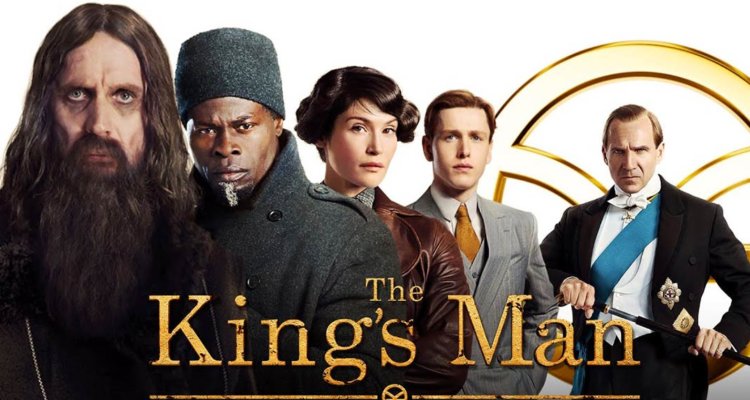20th Century Studios’“The King’s Man” peaks somewhere around the middle, during the scene in which the sunken-eyed ghoul Rasputin (portrayed by Rhys Ifans, having a ball) performs some manner of restorative metaphysical cunnilingus by pressing his lips to the unmistakably yonic leg wound that undercover hero Orlando (Ralph Fiennes) sustained back in the Boer War. The Russian mystic of repute then proceeds to projectile vomit for a brief moment, before revealing that he’s immune to the poison he’s been dosed with, and then engaging our man in balletic hand-to-hand combat set to the music of Tchaikovsky’s 1812 Overture. This is as good as it gets, an anything-goes historical revisionism jamboree in which the factual record isn’t allowed to get in the way of a cracking action sequence with a healthy sense of humor about its own outlandishness.
READ MORE: The 100 Most Anticipated Films of 2022
But this delightful setpiece is something of an outlier in Matthew Vaughn’s prequel to his popular series of adventures in espionage and Anglophilia. As much fun as he and co-writer Karl Gajdusek have with the major names in turn-of-the-century geopolitics, there are a few things they prefer to regard with grave seriousness. Where the previous franchise entries contented themselves with the simple, agreeable notion that one’s conduct matters more than their standing by birth, the latest addition goes all-in on its wobbly semblance of a conscience while tamping down the laddish mischief. Here is the dumbbell version of a thinking person’s blockbuster, in which its Big Ideas about colonialism, class, monarchy, and empire collapse under its inseparable fetishes for violence, England, and manhood. Orlando constantly touts the preciousness of civility in a world on the garden path to hell, taking up arms against the enemy only because he must. The film containing him models far less ambivalence on the subject, in giddy thrall to the same brutality it would like us to believe it’s denouncing.
READ MORE: The 25 Best Films Of 2021
Orlando may be the Duke of Oxford, but he’d have us know that he’s an unusually forward-thinking member of the landed gentry. He resents the system of haves and have-nots stratifying British society and recognizes the dignity of the servants who make up his covert intelligence network reporting back from the halls of power they keep stocked with snacks. This loose organization, rebranded as the shadow-MI6 known as Kingsman by the conclusion faces its greatest challenge with the eruption of World War I — which, by the way, was actually a Scottish separatist plot to destroy Old Blighty carried out by an international cabal of supervillains including Gavrilo Princip, Lenin, and the Du Pont family. At least the scenes of their meetings demonstrate a welcome self-awareness of the absurdity of this expensive Euro-fanfic. Everyone sits at a long table like they’re Dr. Evil’s flunkies, and the obligatory German representative (Daniel Brühl) has been duly outfitted with a monocle from Lenscrafters’ Sinister Gravitas collection.
But the film’s nostalgic streak for early-twentieth-century archetypes often overtakes its insistently espoused equality-first position. Orlando claims to have nothing but respect for his African manservant Shola (Djimon Hounsou, better than this), even though the character gets little to do beyond getting shot and addressing his master as “my grace.” Same deal with the token woman Polly (Gemma Arterton), whose purported expertise is mostly limited to rolling her eyes at the silly boys or baking. Documented homophobe Rasputin has been turned gay for no other reason than homosexuality presumably spooking the writers, and a Fu Manchu-looking character sits down at the table from him in their conferences of evil. It is probably for the best that we don’t hear him speak.
The internal contradictions are even more pronounced in the subplot concerning Orlando’s son Conrad (Harris Dickinson), who wants nothing more than to join the military effort his dad’s trying to prevent. Knowing the hell of war all too well, Orlando strictly forbids his boy from going off to do “All Quiet on the Western Front” cosplay, his solemn pro-peace attitude affirmed during the film’s po-faced interlude in the trenches. But the crisply choreographed fight sequences and “1917”-styled field battles, while putting much of Hollywood’s recent output to shame, indulge in the savagery that they would condemn in the same breath. Everyone knows Truffaut’s adage about the inability to make a film criticizing war without inadvertently glorifying its carnage; this one barely even makes the effort.
The final act nearly suffocates in these hypocrisies, as the faux-virtuous Orlando accelerates a conflict he abhors to preserve the crown royalty he doesn’t support. His inconsistencies give away the underlying value set of a film that pays ample lip service to today’s political correctness while tacitly clinging to a more reactionary mindset. It’s all there in the series’ ongoing obsession with the quality of being gentlemanly. There’s lots of talk about Arthurian chivalry, doing the right thing, manners maketh-ing man, and yet, in the end, it’s really just about wearing impeccably tailored suits. [C+]

